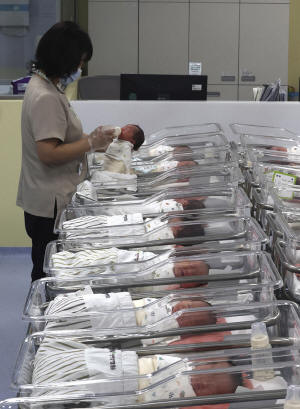South Korean births increased last year for the first time in nearly a
decade
[February 28, 2025]
By HYUNG-JIN KIM
SEOUL, South Korea (AP) — The number of babies born in South Korea
rebounded for the first time in nine years in 2024, welcome news for a
country grappling with one of the the world’s most serious demographic
crises.
South Korea’s statistics agency said Wednesday that 238,300 babies were
born last year, an increase of 8,300 from a year earlier. It said the
country’s fertility rate — the average number of babies born to each
woman in their reproductive years — was 0.75 in 2024, up from 0.72 in
2023.
It’s the first time that the yearly number of births has increased since
2015.
“It’s fair to say this is a considerably meaningful rebound,” Choi Yoon
Kyung, an expert at the Korea Institute of Child Care and Education,
said Thursday. “We still have to see figures in the next few years to
find whether it was a temporary rebound or it was driven by structural
changes.”
Park Hyun Jung, a senior official at the Statistics Korea, said that her
agency assessed the increase in births was partly attributable to an
increase in marriages among couples who delayed weddings during the
COVID-19 pandemic period.
Park said that another factor behind the rebound was a growing number of
people entering their early 30s. She also cited a government survey
showing a small increase in the number of young people hoping to have
children after marriage.
Official data show South Korea’s fertility rate has been the lowest in
the developed world in recent years. In 2022, it was the only country
whose fertility rate was below 1 among members of the Paris-based
Organization for Economic Cooperation and Development.
The low fertility rate poses a major potential threat to South Korea’s
economy, Asia's fourth largest, as it will cause labor shortages and
greater welfare spendings. South Korea’s central and regional
governments have been increasingly offering a variety of financial
incentives and other support programs to those who give birth to
children.

[to top of second column]
|

A nurse takes care of a newborn baby in a neonatal room of a
hospital in Incheon, South Korea, Wednesday, Feb. 26, 2025. (Jeon
Jin-hwan/Newsis via AP)
 But experts say that it will be
extremely difficult to address the country's demographic challenges
as young people don't want to have babies, owing to a mix of factors
that make it difficult to raise them in the brutally competitive,
fast-changing country. They cite expensive housing, low levels of
social mobility, the huge cost of raising and educating children and
a culture that requires women to handle far more of childcare.
Park said that the fertility rate will likely stay on an upward
trend at least for another year. But observers say it remains to be
seen whether the rate will go back down as post-pandemic marriages
even out. The country’s demographic structure will also eventually
see a drop in people in their early 30s.
Some experts argue that the government should focus on supporting
young couples who want to have babies, rather than providing broad
programs meant to address diverse social problems.
“There are still people with solid wills to have a family and
babies. When we help them realize their hopes, our fertility rate
won’t suffer a steep, 45-degree drop,” Choi said.
All contents © copyright 2025 Associated Press. All rights reserved |